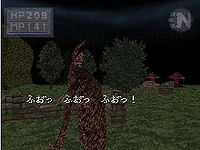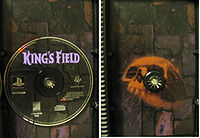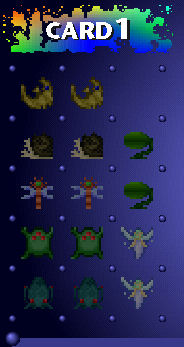King's Field Trivia: Difference between revisions
Jump to navigation
Jump to search
Dragonking (talk | contribs) No edit summary |
Verdite cat (talk | contribs) No edit summary |
||
| Line 41: | Line 41: | ||
* The two headed snail creature from KF2 was called S-Knight in the English games. The original Japanese name was a 'clever' combination of the words 'Snail' and 'Knight' (pronounced like 'snay-ite'). Presumably, the name was changed to S-knight because the original reference would not have worked well in English with the silent K in knight and the same sounding word 'night'. | * The two headed snail creature from KF2 was called S-Knight in the English games. The original Japanese name was a 'clever' combination of the words 'Snail' and 'Knight' (pronounced like 'snay-ite'). Presumably, the name was changed to S-knight because the original reference would not have worked well in English with the silent K in knight and the same sounding word 'night'. | ||
[[Category:Legacy]] | |||
Revision as of 07:51, 12 September 2024
- The only untranslated Japanese in King's Field 2(US) is spoken by the friendly log stalker Mel Morris. It was likely left untranslated because it is an animalistic 'grunt' and not actual words. One of the characters is not even a normal Japanese letter.
- The original King's Field was the first RPG ever released for the PlayStation System, going on sale December 16 1994, less than two weeks after the PlayStation console debuted, while King's Field II (marketed in the US as "King's Field") was the first RPG for the PS1 released outside of Japan, with a release date of February 15, 1996.
- Several characters in the KF2(US) and KF:TAC were names after people who worked on localizing the game or members of the Agetec forum.
- In Kings Field 2(US)
- Marc Johnson: Named after Agetec's producer who worked on localizing KF2 and wrote the King's Field Chronicles in the official strategy guide.
- Tim Lindquist: A graphical designer who worked for Agetec on several aspects of KF2 including the logo. His review is also on the back of the KF2 game.
- In King's Field: The Ancient City
- Akryal the Priest: Named after the band and username of Agetec forum member Tom Eversol.
- David Bunch who sells you the first wind crystal: A member of the Agetec forum with the username Sojurner.
- Lynn the little girl with a dog: Was named after forum member "Archmage Lynn" and her ingame mother was named after her real life mother.
- JohnnyPark soldier eaten widda freak: Named after the username of an Agetec forum member.
- Martin Ramerez the plump soldier: Named after the person who runs Kings-field.com who was an active member of the Agetec forums.
- Mista Fopa the elf: Named after the the screen name of an Agetec forum member.
- Paul Hutchinson who asks for poison because things are taking his fish: Named after Agetec forum moderator Valkysas.
- Duhrin Pathwardin the old man who gives you a rusty key to open his house: Named after Agetec producer Mark Johnson's forum name 'Duhrin'.
- In Kings Field 2(US)
- In KF(US) the MechaTermite enemy has the FromSoft logo hidden on its underneath side.
- In SoM, the the texture used for the antidote herb looks suspiciously like a photo-shopped picture of a person bending over and mooning the camera with their elbows up in the air. . . at least it looks much more 'organic' than other textures which are clearly computer drawn . . . hmmm Moonstones and Moonherbs??
- In KF:TAC, The sign David Bunch is scrubbing says "Ecno Erom Thgilnoom Drows Gniws" which is "Once More Moonlight Sword Swing" backwards.
- The disk design on KF1(US) is a stone wall that matches the wall printed in the insert behind the disk. But when the disk is removed, it reveals a hidden skull. Spooooly!
- King's Field 2 had seven different animated icons for save game slot which showed various creatures from the game.
- The two headed snail creature from KF2 was called S-Knight in the English games. The original Japanese name was a 'clever' combination of the words 'Snail' and 'Knight' (pronounced like 'snay-ite'). Presumably, the name was changed to S-knight because the original reference would not have worked well in English with the silent K in knight and the same sounding word 'night'.




